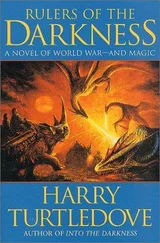Cornelu left in a hurry. He wished he’d never gone into the shop. He wanted to think of Sibiu as united in the effort against Algarve. He knew that wasn’t so, but thinking of it as being so helped him do his job better. Getting his nose rubbed in the truth had the opposite effect, one he didn’t want.
He hurried down the hill to the harbor. Gulls scavenging garbage from the gutters rose in mewing, squawking clouds as he strode past them. He hoped none of them would avenge itself on his hat or the sleeve of his tunic. As if to give that hope the lie, a dropping splashed on to the cobbles only a yard or so from his shoe. He hurried on, and reached Commodore Delfinu’s office unbefouled.
After the two men exchanged salutes and kisses on the cheeks, Cornelu asked, “Sir, have we had any better luck in getting leviathans into the Barian ports?”
Glumly, Delfinu shook his head. “No, and we’ve lost more men trying, too, as you will probably have heard.” When Cornelu nodded, the head of the Leviathan Service went on, “The Algarvians have Imola and Lungri as tightly locked up as if they were virgin daughters. They keep dragons in the air over them all the time, too, so we can’t learn from above what they’re doing, either.”
“Curse them,” Cornelu said. Dragons above Tirgoviste were one thing, dragons above the ports the enemy had taken for his own something else again—something ominous. Cornelu took a deep breath. “If you like, sir, Eforiel and I will cross the strait and see what they’re up to—and, if you like, put down some eggs to keep them from doing it, whatever it is.”
Delfinu shook his head again. “I am ordering no man across the strait to Lungri and Imola. I have lost too many. The Algarvians are not so skilled in using leviathans as we are”—pride rang in his voice—“but they have become all too skilled at hunting them down.” The pride leaked away, to be replaced by chagrin.
“My lord, you need not order me.” Cornelu drew himself up to stiff attention. “I volunteer my leviathan and myself.”
Delfinu bowed. “Commander, Sibiu is fortunate to have you in her service. But I will not take advantage of your courage in this way, as if I were a cold-blooded Unkerlanter or a calculating Kuusaman. The odds of success do not justify the risk… and your wife is with child, is it not so?”
“Sir, it is so,” Cornelu said. “But I am not with child myself, and I took oath to serve King Burebistu and his kingdom as best I could. What the kingdom requires of me, that shall I do.”
“This the kingdom does not require of you,” Delfinu said. “I have no desire to make your wife grow old a widow, nor to make your child grow up not knowing its father. I will send you into danger: indeed, I will send you into danger without a qualm. But I will not send you to almost certain death when no good to king or kingdom is likely to come from it.”
Cornelu bowed in turn. “My lord, I am lucky to have you as my superior. Unlike the no—” He stopped, unsure how Count Delfinu would take what he’d been on the point of saying.
Even though he hadn’t said it, Delfinu figured out what it was. “Unlike the nobles in the Kaunian kingdoms, ours are supposed to know a little something before they put on their fancy uniforms? Is that what you had in mind, Commander?” To Cornelu’s relief, he laughed.
“Well, aye, sir—something on that order, anyhow,” Cornelu admitted.
“Kaunian blood is older than ours, which makes them take more pride in it than we do,” Delfinu said. “If you ask my opinion, being older only makes it thinner, but no Kaunian has seen fit to ask my opinion. For my part, I confess to losing very little sleep over theirs. Personally, I feel more sympathy for Algarve, but I know my kingdom’s needs come ahead of my personal sympathies.”
“Myself, I have no great use for the Kaunian kingdoms,” Cornelu said, “but I have no use at all for Algarve. Did King Mezentio get his hands on us, he would squeeze till our eyes popped out of our heads.”
“Since I think you are right about that, I can hardly argue with you,” Delfinu said. “But, for the time being, I cannot in good conscience send you forth against the Barian ports, either. Enjoy your time off duty, Commander, and keep in mind that it is not likely to last.”
“Very well, my lord.” Cornelu saluted again. “I think I’ll draw a bucket from the rest crate and pay Eforiel a visit in her pen. She’ll think I’ve forgotten her, poor thing. I don’t want that.”
“No, indeed.” Count Delfinu returned the salute. “Very well, Commander, you are dismissed from my presence.”
The chamber in which the large Leviathan Services rest crate sat had a strong fish smell. The smell would have been much stronger had the rest crate been other than what it was. Cornelu reached in and drew forth a big bucket full of mackerel and squid, all of them as fresh as when they’d been pulled from the sea. He lugged it down to the wire-enclosed pen where his leviathan slowly swam back and forth, back and forth.
Eforiel swam to the little wharf that jutted out into the pen. She stuck her head out of the water and examined Cornelu first with one small black eye, then with the other. “Aye, it’s me,” he said, and reached out to pat the end of her tapered snout. “It’s me, all right, and I’ve brought you presents.”
He tossed her a squid. Those enormous jaws came open. They closed on the squid with a wet smacking noise. When they opened again, the squid was gone. Eforiel emitted a soft, pleased grunt. Cornelu fed her a mackerel. She approved of that, too. He kept tossing her treats till the bucket was empty.
He had to show her it was empty. “Sorry—no more,” he said. Now the noise she made, though like nothing that could come from a human throat, was full of disappointment. “Sorry,” he repeated, and patted her again. She didn’t take his hand off at the wrist—or his arm at the shoulder. She was a clever, well-trained beast.
Commodore Delfinu had as much as ordered Cornelu to have a good time while he wasn’t assailing the Algarvians. After taking the empty bucket back for scrubbing, he headed away from the harbor, off to the quarters he shared with his wife. He could think of no one in whose company he would sooner be.
Costache was baking when he walked in; the spicy smell of cakes made the small, square rooms in which they lived seem anything but military. “I’m glad you’re back,” she said. “I didn’t know whether Delfinu would send you out or not.”
“He didn’t,” Cornelu said. That Delfinu had kept him in Tirgoviste because he judged going out to the Barian ports a suicide mission was nothing his wife needed to know. He walked over to Costache, took her in his arms, and gave her a kiss, leaning over the swell of her belly to plant it on her mouth. With a grin, he told her, “I’m glad I’m taller than you are. Otherwise, I’d have to sneak up on you from behind instead of doing this the regular way.”
“If you’d sneaked up on me from behind instead of doing it the regular way, I wouldn’t be expecting now,” Costache retorted. Her green eyes sparkled. Now that she wasn’t throwing up every morning any more, pregnancy agreed with her. Along with her belly, her cheeks were rounder than they had been. To disguise that a bit, she let her red-gold hair fall straight to her shoulders, where she had worn it piled high on her head.
Cornelu did step behind her. He reached around and cupped her breasts in his hands. They were fuller and rounder than they had been, too. They were also more tender—he had to be careful not to squeeze too hard. When he was careful, they were more sensitive than they had been; Costache’s breath sighed out.
“You see?” Cornelu murmured into her ear. “From behind isn’t so bad.” Having murmured into that ear, he nibbled it.
Читать дальше












